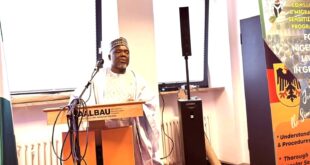Hi again, Nesa here. Welcome back to the second episode of my journey. Today, we dive into my experience relocating from Ghana to Germany, a journey that redefined my path and taught me invaluable lessons about resilience, starting afresh, and seizing opportunities.
To be honest, I never imagined I would settle in Germany. Born here but raised in Ghana, I always thought I would end up in an English-speaking country — Canada, the UK, or the USA. But life had other plans. “How did you end up in Germany?”, you ask. Well, I failed.
Lesson 1: Failure Can Redirect Your Path
Now, I can say I failed with a smile on my face. This was not always the case. Every step I had taken in my life until then had been towards becoming a lawyer. After four years of hard work and dedication in school, failing the law entrance exams felt like a devastating blow. I found myself at a crossroads, questioning everything I had worked for. What was I going to do? I had two options: I could stay in my comfort zone and retake the exam, or I could seize the opportunity to go to Germany, where I had been accepted into a Master’s programme.
Being a lawyer had become part of my identity. I could see the joy it brought my parents to introduce me as an upcoming lawyer. I did not want to disappoint them, and I did not know who I would be if I was not a lawyer. After much prayer, reflection, and many sleepless nights, one thing became clear: I needed to start afresh. I chose to move back to the country I was born in but hardly knew.
This decision, though daunting, marked the beginning of discovering my true path. It was a leap into the unknown, filled with uncertainty and fear, but also with hope and the possibility of a brighter future.
Lesson 2: It Is Okay to Start Afresh
Packing up and moving to Germany was terrifying, but I knew I had to follow through. Upon arrival, I felt an overwhelming mixture of deep connection and complete disconnect. The first thing I noticed were the trees; for some reason, they looked different from the ones back home.
Then there was the deafening silence; even the cars were eerily quiet. I instantly started missing the familiar cacophony of honking cars, the comforting smell of home, and the people in the streets with wide, welcoming smiles on their faces.
I took a deep breath. This was a new beginning; no one knew me here. I was about to start from scratch. Was it lonely? Absolutely. Did I feel like going back home? Many times. But I had made this choice with the intention of bettering my life, not just for myself but also for future generations. I was determined to follow through with it.
My plan was to study for two years, work for a year or two, and then return to Ghana. I was often scared and unsure, but this journey taught me that starting afresh is not just okay—it can be the key to finding your purpose.
Lesson 3: Your Studies Must be Relevant for the Future
I did not want to part ways with the law I had become so accustomed to. I genuinely loved reading, researching, writing, and helping people, so a Master’s in Human Rights and Humanitarian Law was perfect for me. This programme allowed me to delve deeper into the subjects I was passionate. I gained a wealth of knowledge that will stay with me forever, and the experience profoundly shaped my perspective.
After completing my studies, I realised the importance of choosing a field that would keep me valuable in the job market. Fortunately, I was able to continue working at the place where I did my internship (more on that in the upcoming episodes), not everyone has that opportunity. In today’s Germany, with a declining workforce and a shortage of skilled workers, it’s crucial to identify market gaps and position oneself to fill them.
If I were starting my studies in 2024, I would carefully research areas where Germany needs skilled professionals and align my studies accordingly. Staying relevant and valuable to the nation you reside in is essential for career advancement. By focusing on future job market trends and the country’s needs, you can ensure your skills remain in high demand, making you an indispensable asset.
Practical Advice on Internships
To piggyback on lesson three, finding a relevant internship is crucial after your studies. Universities in Germany often recognise internships that align closely with your field of study, so it’s important to plan accordingly. For example, if you studied law, an internship at an IT firm as a software developer will not suffice. Ensure your internship enhances your expertise and contributes meaningfully to your career path.
NB: For those considering the Chancenkarte (Opportunity Card), it’s essential to ensure that your chosen job will remain in demand. Germany offers numerous opportunities, but it’s important to choose wisely. Research the job market, understand the future trends, and align your skills and career goals with areas that promise growth and stability. By doing so, you can seize the opportunities available and build a sustainable and rewarding career.
Conclusion
My journey from Ghana to Germany was filled with unexpected turns, but each step taught me invaluable lessons. Failure redirected my path, starting afresh led to self-discovery, and my studies set a strong foundation for me. Remember, every challenge is an opportunity in disguise. Embrace change, stay motivated, and believe in the possibilities ahead. Your journey is just beginning.
 THE AFRICAN COURIER. Reporting Africa and its Diaspora! The African Courier is an international magazine published in Germany to report on Africa and the Diaspora African experience. The first issue of the bimonthly magazine appeared on the newsstands on 15 February 1998. The African Courier is a communication forum for European-African political, economic and cultural exchanges, and a voice for Africa in Europe.
THE AFRICAN COURIER. Reporting Africa and its Diaspora! The African Courier is an international magazine published in Germany to report on Africa and the Diaspora African experience. The first issue of the bimonthly magazine appeared on the newsstands on 15 February 1998. The African Courier is a communication forum for European-African political, economic and cultural exchanges, and a voice for Africa in Europe.

































